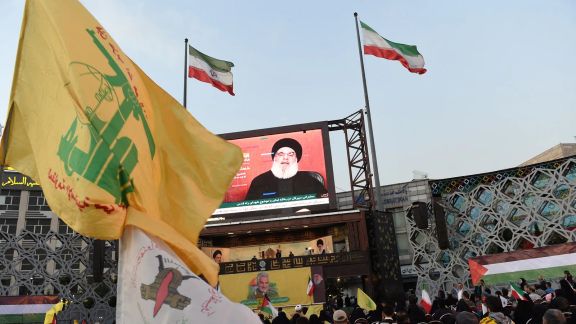Israel says it foils Iran-backed Hezbollah assassination plot in Israel

Israel says it has foiled an Iran-backed Hezbollah plot to assassinate a former security chief on Israeli soil as the terror group gets ever more emboldened in its operations.

Israel says it has foiled an Iran-backed Hezbollah plot to assassinate a former security chief on Israeli soil as the terror group gets ever more emboldened in its operations.
The assassination attempt on a senior security official was imminent and was foiled after the discovery of a Claymore explosive device, known to be used by Hezbollah.
The explosive device found in Israel was equipped with a remote activation mechanism, with a camera and cellular technology, enabling it to be activated by Iran’s biggest proxy, Hezbollah, from Lebanon.
The Israeli military said that the device was similar to the Claymore explosive used in an attack by Hezbollah in September last year, in Yarkon Park in Tel Aviv, which was intended to target a senior Israeli official.
“The assessment within the security establishment is that the Hezbollah operatives involved in this latest incident were also behind the September 2023 attack,” a statement read, adding that the operation “had been under surveillance for an extended period”.
Ronen Solomon, an Israeli intelligence analyst, said the operation also bears similarities to a bombing attack in March last year in northern Israel. A Hezbollah operative had infiltrated the border and seriously injured a man in the area of Megiddo with an explosive device.
“Israel knows all the people behind all these units. Some have been assassinated, including Saleh Arouri who was the Hamas external connection working with Unit 2500. They’re using Hamas’s south Lebanon branch,” he said.
Like the Yarkon Park attack, the latest assassination attempt was planned for 6am, usually when a target would be out in some part of their daily routine, like running.
“I understand that Lebanon wanted to do it remotely by cellphone, so it’s not something that was to be done with a timer or an agent on the ground in the vicinity. This was a long distance operation but it was a complicated operation and something you need to have a circle of operatives,” Solomon added.
Solomon said that what is surprising now, is that even amid a war when Israel’s borders are locked down, that the infiltration was possible, pointing to links with Arab-Israeli or Palestinian operatives in the West Bank or East Jerusalem.
Hezbollah has also used criminal gangs in Israel to smuggle weapons and explosives across the borders.
“It makes you wonder how they are infiltrating and suggests that maybe the operatives came from Jordan to Jerusalem. They have to recruit someone from the West Bank. We know this kind of bomb is being smuggled from Jordan,” Solomon said.
The operation would span three units of Hezbollah, 1800, the strategic unit which gets weapons and explosives into Israel. They have been trying such operations since the early 2000s.
Unit 133 handles the operatives on the ground to pull the trigger, and 2500 which is managed by Hezbollah but is a mix of Iran’s Quds Force and Palestinian militias, would also be involved, Solomon explained. It has overseen the recruitment of operatives abroad including Turkey and Africa, as well as inside Israel and the occupied territories.
“Because Israel knows the identity of most people in these units, maybe we will now see more eliminations like we saw before,” he said.